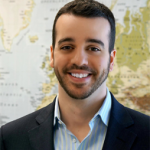Steli Efti, Founder & President at Close.io Interview
Transition from service to produce and sharing candidly, especially the struggles.
Background on Steli
- Originally from Greece and grew up in Germany
- Dropped out of school at 17
- Launched first few business then.
- Bought a 1 way ticket to Silicon Valley
- First business was a soul crushing failure.
Launching Close.io
- Close.io started as an outsourced sales function. They started developing internal software to empower their sales people.
- January 2013 they launched the software on its own. Within one year it was larger than the other business.
Transition from the services business to the product business. What did you do to ‘retool’?
- Reality is fairly messy
- Never intended to launch software business
- Had no vision of the software, simply, what do we need? Took a year to determine that they had a perspective.
- Going through difficulties on service business. Tough to manage from cash flow perspective. Staffing, seasonality,
- Were not sufficiently capitalized to manage through the down turns of seasonality.
- Product took off and grew quickly, with little resources.
- Within a few weeks they made tough choices and let go of half of our team.
- Blog post, I fired half my team.
- Spent a lot of time with people on the team making sure they were okay.
- Spent time with those they had to let go. They are all current customers.
What prompts you to be so open and candid about the struggles involved with the startup world?
- On a person to person basis was always transparent.
- Very self-reflective guy, has always looked inside to see what he fears, the bias, all of the negatives.
- After shutting down his first business he realized that he’d tried to pretend. E.g. Working for 17 hours (but only being productive for 5)
- Steli Efti, TedX, cathartic. Helped him.
- Since that talk has tried to be more and more open publicly.
- Tends to teach and talk about things that are on his mind.
- Because there’s a lot of self-study and self-mastery he’s just sharing what’s on his mind.
- Personal philosophy: teach everything I know.
- Is profoundly impacted by helping other entrepreneurs get through their difficulties.
Why the trend to openness about their vulnerable points?
- The reason we want to hear them is we’re authentic human stories.
- Today, it’s getting safer for people who have made it through the roughest patch and are in a good place.
- As people see there’s not a terrible response, they are more comfortable
How do we move this level of openness and sharing into the larger corporate culture?
- Not worked in a large organization himself so it’s difficult to say
- There will need to be early adopters, pioneers, leaders, etc. will need to lead the way.
- A few will be inspired enough to translate that, take some risks and share some risky thoughts.
- If, perhaps, that goes viral it can catch on.
- Believes that the time of massive organizations will start to die out over the next 10-15 years.
- Large organization will break up into decentralized organizations.
- That will make more of these corporate jobs, more nimble, more agile and adaptive.
- There’s always some risk involved in doing real work.
What piece of advice would you give to our listeners that will help them get better today?
- If you’re really about being better every day, look at what you’re afraid of. Ask yourself, what are you afraid of?
- It’s probably your next big step. It’s a road sign. Now, write it down and go confront it. How can you force yourself to take that step now, not tomorrow, now?
Hear & Contact Steli
- Podcast: StartupChat
- Sales and more tactical stuff: http://blog.close.io
- Best way to reach Steli: Steli@close.io
- Twitter: http://twitter.com/steli
